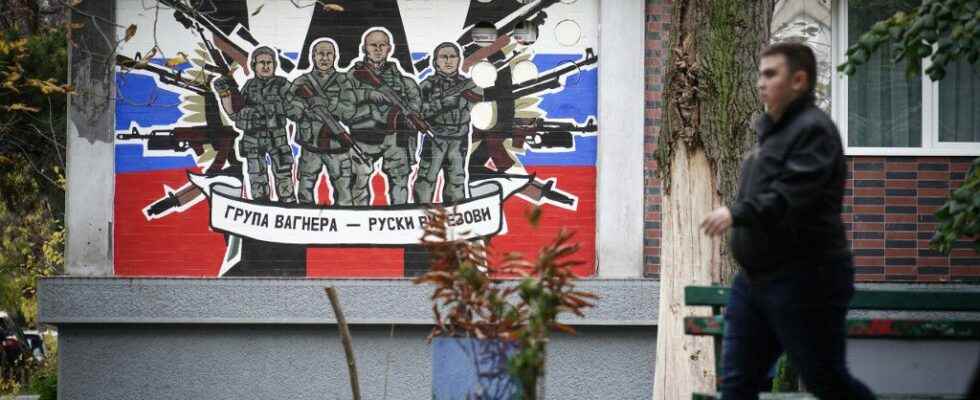In recent weeks, messages urging Serbs to go and fight in Ukraine alongside the Russian paramilitary group Wagner have appeared on some social networks, as well as on Russia Today (RT). The channel, pro-Russian, is still authorized to broadcast in this Balkan country candidate for the European Union, while it has been suspended in the rest of Europe. According to several specialists contacted by L’Express, these messages “broadcast in Serbian” relayed the procedure to follow to go to fight or the salary expected by a soldier who would join the ranks of Wagner. “These announcements are more public than we think,” points out a political adviser working in the region.
In Belgrade last week, a mural depicting the skull and crossbones emblem of the paramilitary group Wagner was painted in the city center. Signed by the far-right organization Narodna Patrole (People’s Patrols), it was quickly erased. But the message relayed through a video, released on Tuesday by the Russian news agency RIA, was even more transparent: it shows two masked men, identified as Serbian volunteers, during a weapons training course in the areas under Russian control in the Zaporizhia region.
“Why are you calling the Serbs?”
In response to the unrest, Serbian President Aleksandar Vucic, who speaks very rarely, openly scolded the paramilitary group. “Why is Wagner doing this to Serbia?” he asked in a televised address. “Why are you calling the Serbs when you know it’s against our regulations?” he added. According to a Serbian law passed in 2014, it is forbidden to participate in a foreign conflict. “This legislation was put in place because, at the time, there were on the one hand those who went to Donbass to fight alongside the Russians and on the other those who went to Syria”, explains Loïc Tregoures, researcher at the Institute for Advanced National Defense Studies (IHEDN). “Even if it is prohibited, we know that Serbs have been joining the Russians to fight in Ukrainian territories since 2014, continues the researcher specializing in the Balkans. But it is not a massive movement: it is a question of a few dozen people at most.”
In a Telegram message, the leader of the Russian paramilitary group Wagner, Evgueni Prigojine, denied these recruitment attempts in Serbia. “Rumors about Wagner’s cooperation with Serbia are completely unfounded,” he said, indicating that there are no more Serbs in the composition of his troops, “and for a long time”.
Since 2014, Serbian courts have reportedly convicted around 30 people for participating in “fighting on foreign fronts”. “The figures on the number of Serbian recruits alongside the Russians are not known, opines Jean-Sylvestre Mongrenier, researcher at the Thomas More Institute, specialist in defense issues. These numbers do not seem very large, but the fact , is significant.”
Nevertheless, for the two researchers, President Vucic’s communication is skilfully crafted to fulfill a double objective: not to directly accuse Russia and, at the same time, to signal its firmness to the European Union. “In his statement, he attacks Wagner but never mentions Russia, or even the Russian ambassador to Serbia,” notes Loïc Tregoures. “Vucic knows very well that some of these fellow citizens are fighting alongside the Russians. Politically, it does not cost him much to attack Wagner,” said a political adviser working in the region. “It is especially necessary to highlight this declaration in relation to the arrival, a few days later in Belgrade, of a delegation from the European Union and the United States with regard to the status of Kosovo”, adds this same source. This former Serbian territory declared its independence in 2008, but is recognized neither by Serbia nor by the United Nations or the European Union.
Serbia, a pro-Russian stronghold
Moreover, if Wagner allows himself such visible recruitment attempts in Serbia, it is largely due to deep-seated pro-Russian sentiment. While Paris, Rome, Prague, Berlin or even London don Ukrainian colors on official buildings, Belgrade is covered in Russian colors. “Belgrade is the only major city in Europe where demonstrations in support of Russia have taken place,” notes Loïc Tregoures. Since the start of the invasion, several demonstrations of support for the Russians have taken place in the streets of the capital, portrait of Vladimir Putin in hand, some even going so far as to trample the European flag. “The close relationship between Serbia and Russia revolves around the energy issue and diplomatic support from Moscow to Belgrade on Kosovo,” comments Loïc Tregoures.
Serbia is entirely dependent on gas imports from Russia. While the Europeans have set about isolating Russia, in particular by stopping to buy fossil fuels from it, Belgrade has done the exact opposite. This summer, the country obtained from Moscow the renewal of an agreement for the supply of gas for a period of three years.
And on the question of Kosovo, which Belgrade considers as an autonomous province of its territory and not as an independent country, Russia has been, since 2008, an ally in the face of an international community which would like to see the question settled. Before the United Nations Security Council, the country led by Vladimir Putin is still using its veto on the recognition of Kosovo’s independence. “In reality, Russia has been fighting diplomatically alongside Serbia for years, which makes them close allies,” said a political observer. Among the Serbian population, Russia seems more appreciated than the EU and NATO. “There is strong sympathy in Serbian opinion for Russia and for the figure of Putin, who is perceived as a strong man who has straightened out a country in ruins and who opposes the United States. In a country that keeps living memory of the 1999 bombings counts. But that does not mean that hundreds or thousands of Serbs are ready to go and fight in Russia”, concludes Loïc Tregoures.
